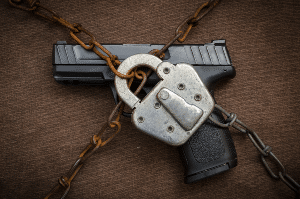San Diego County Makes the Most Use of California’s Red Flag Law
 In 2014, the State of California passed a gun violence restraining order law in response to the Isla Vista shooting. The law allows immediate family members to petition a judge to order the temporary removal of guns from an individual who may be making threats of violence. Since then, San Diego County has relied on the law more than any other county in the state to confiscate weapons from people considered a threat to themselves or others.
In 2014, the State of California passed a gun violence restraining order law in response to the Isla Vista shooting. The law allows immediate family members to petition a judge to order the temporary removal of guns from an individual who may be making threats of violence. Since then, San Diego County has relied on the law more than any other county in the state to confiscate weapons from people considered a threat to themselves or others.
Since 2017, San Diego County has issued more than 300 gun violence restraining orders. These orders have been used to confiscate weapons in a variety of cases, including in cases of domestic violence, suicide threats, and mental illness. In 2019 alone, police responded to 200 cases with a gun violence restraining order and confiscated firearms from 62 of those individuals.
If you’re a gun owner in San Diego, you have reason to believe that your gun rights are being threatened by this law. If you face the possibility of having a restraining order issued against you, it may be wise to contact a criminal defense lawyer who protects gun rights near you.
How Does a Gun Violence Restraining Order Work?
A gun violence restraining order is a court order that prevents an individual from owning or having access to:
- Guns
- Ammunition
- Magazines
The restraining order may require a person to:
- Not possess a gun, ammunition, or magazines;
- Avoid buying a gun, ammunition, or magazines; and
- Turn in any guns, ammunition, and magazines to the police, sell them, or store them with a licensed gun dealer.
Not just anyone can ask for a gun violence restraining order in California. You must be a close family member or a member of law enforcement to petition a judge to grant this type of order against a person who may own firearms. Close family members may include:
- Spouses or domestic partners
- Parents
- Children
- Siblings
- Grandparents
- Grandchildren
- Spouses of parents, siblings, grandparents, or grandchildren
- Your spouse’s parents, children, siblings, grandparents, or grandchildren
- Anyone who regularly lives in your house or has lived with you for the past six months
If you’re not closely related to someone you may believe poses a threat to themselves or the community, you may still notify the police.
How Do Police Confiscate Weapons from Law-Abiding Citizens?
Police officers who suspect an individual may harm themselves or others using firearms may petition a judge for a temporary gun violence restraining order to keep the individual from owning or possessing firearms for a specified period. Police officers may bring cases based on evidence that the respondent may be a threat. Evidence may consist of statements the individual made or actions they took that may appear threatening, whether or not the statements or actions themselves were illegal.
In one well-known case where officers successfully applied the gun violence restraining order law, police officers confiscated the weapons of a car dealership employee whom fellow coworkers claimed had praised the perpetrator of the 2017 Las Vegas shooting. According to statements made by the other employees, the individual remarked that he was “genuinely impressed by the death toll” and had himself thought about attempting a similar attack at a house of worship. Fellow employees who overheard the conversation in the breakroom grew uneasy knowing that this individual, who owned a firearm, also stated that he would kill them all if he were fired.
Using these statements, police requested a gun violence restraining order (GVRO)—which was granted by the court—and seized two handguns, two shotguns, and an AR-15.
Who Will Defend Me When I’m at Risk of Losing My Gun Rights?
Attorney Dod of Dod Law has more than 17 years of experience representing individuals accused of misdemeanor and felony offenses in San Diego and surrounding areas. He has worked on more than 6,500 criminal cases, including more than 75 jury trials and 400 preliminary hearings. He is uniquely qualified by the California State Bar to represent serious capital offenses.
When your gun rights are at stake, it’s crucial to seek competent and determined representation. You can find it at Dod Law. Call (619) 814-5110 or complete our contact form to learn how to defend your rights.
At a Glance
Meet Attorney Dod Ghassemkhani
- Recent Case Results
- San Diego Criminal Defense Bar Association | Named San Diego County’s 2023 Trial Lawyer Of The Year
- Award Winning Criminal Defense Attorney
- The National Trial Lawyers: Top 100 Trial Lawyers
- Over 20 years of criminal defense experience
- 10.0 “Superb” Avvo Rating
